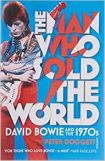The Man Who Sold The World: David Bowie And The 1970s by Peter Doggett
| The Man Who Sold The World: David Bowie And The 1970s by Peter Doggett | |
|
| |
| Category: Entertainment | |
| Reviewer: John Van der Kiste | |
| Summary: A study of the life and work of the British singer, focusing largely on his career in the 1970s, with a detailed examination on every track he recorded up to 1980. | |
| Buy? Yes | Borrow? Yes |
| Pages: 424 | Date: October 2012 |
| Publisher: Vintage | |
| External links: Author's website | |
| ISBN: 9780099548874 | |
|
| |
With hindsight, it’s difficult to argue with the oft-expressed opinion that David Bowie was the single most important rock musician of the 1970s. Having been a perpetual ‘one to watch’ from around 1966 onwards but with only one hit during that decade, ‘Space Oddity’, from 1972 onwards he went through several remarkable self-reinventions in musical style, with an uncanny knack of being able to pre-empt the next big trend. In examining his whole career but focusing largely on his work throughout that particular decade, Peter Doggett looks specifically at every song he recorded, including cover versions. There are also boxed-out features on each album, and articles on related topics such as ‘The Art of Minimalism’ and ‘The Heart of Plastic Soul’. He concludes that by 1979 the man’s extraordinary creativity was more or less spent and his subsequent output, successful though it may have been, was in effect treading water up to his ‘elegant, unannounced retirement’ in 2007.
As he evaluates and describes individual songs, the author acknowledges his debt to the late Ian McDonald’s groundbreaking study of the Beatles’ tracks, ‘Revolution In The Head’. MacDonald had planned to write a similar book on Bowie in the 1970s himself, but had barely even begun planning it before he took his own life in 2003.
From the Ziggy Stardust era to the move to Los Angeles and the ‘plastic soul’ era of ‘Young Americans’, the drug-addled period and ill-advised flirtation with fascism in the ‘Thin White Duke’ business a year later, then the work in Berlin and Montreux on the ‘Low’, ‘Heroes’ and ‘Lodger’ albums, Bowie reflected and encapsulated not only various musical trends but also various social and political themes. On the other hand, surely only his most devoted fans would be able to argue against the theory that much of his work was slick, very calculated and often rather pretentious. Doggett realises this, and although evidently a fan, he is rightly critical about much of what comes under his microscope in these pages. ‘Sound and Vision’, a hit single early in 1977, is seen as an admission by its creator that his creative vision had disappeared, so he used a confession of artistic bankruptcy to spark his muse back to life. Only a year earlier, he had admitted that he did not know how much longer his albums would sell as he planned they would become more diversified, more extreme and radical – and he didn’t care.
Some historians of popular culture suggest that the 1970s really came to an end in 1980 with the killing of John Lennon. If that is the case, Doggett evidently goes along with this. It was probably true in the case of Bowie’s career, as the release of his 1980 album ‘Scary Monsters and Super Creeps’ was the end of an era for him as well. In its best-known track, the chart-topping single ‘Ashes to Ashes’, Bowie suggested that his alter ego Major Tom, who had become a junkie and had never done anything good, bad or out of the blue. Was this life imitating art, maybe? The ‘Scary Monsters’ album ended with the sound of a tape running off the reel, as if he was telling the listeners, ‘That’s it, I have nothing left to offer you.’
It was a good time for him to take a back seat. Mark David Chapman had apparently considered not Lennon as his target but Bowie, who was on stage in New York only about a mile away at the time his friend, the former Beatle, was shot dead. Moreover, a settlement between Bowie and his ex-manager had ensured that the latter would receive a substantial percentage of his earnings until 1982. There were thus compelling reasons for putting all new recordings and concert tours on hold until after that. His re-emergence resulted in the biggest-selling album of his career, ‘Let’s Dance’, but showed him ‘offering merely the palest shadow of his former iconoclasm’, in which he had ‘shed any sense of artistic integrity’.
So let’s return to the main focus of the book. Doggett offers several penetrating insights into each new development of the years when Bowie was rewriting the rule book, forging new directions all the time. His looking at each song in remarkable detail includes the early material recorded in the mid-1960s, although all but the most musically-minded readers may want to skim some passages. Take these comments on ‘The Man Who Sold the World’, for example: a compact, elegantly assembled piece that featured none of the metallic theatrics found elsewhere on the album....the chord structure was equally treacherous, repeatedly augmenting its key of F with an A major chord borrowed from the relative minor scale of Dm. Unless the reader is undertaking a thesis for a university degree or something similar, it is debatable as to whether a rock song really needs such minute analysis.
From my viewpoint, I’ve always been interested in Bowie as a performer without being a devoted fan or avid collector of his work. I find some of his records entertaining, but others leave me cold. This book proved a very interesting read, but it did nothing to alter my conception that as rock musicians go, Bowie was a very intense, calculating, clever (in all senses of the word) artist who often took himself too seriously for his own good. I suspect that the author, whose other books on music have included a first-rate study of the Beatles, You Never Give Me Your Money, may have felt much the same when he completed this.
If this book appeals then we can recommend Tony Visconti: the Autobiography: Bowie, Bolan and the Brooklyn Boy by Tony Visconti. You might also enjoy Bageye at the Wheel: A 1970s Childhood in Suburbia by Colin Grant.
Please share on: ![]() Facebook,
Facebook, ![]() Twitter and
Twitter and
![]() Instagram
Instagram
![]() You can read more book reviews or buy The Man Who Sold The World: David Bowie And The 1970s by Peter Doggett at Amazon.co.uk Amazon currently charges £2.99 for standard delivery for orders under £20, over which delivery is free.
You can read more book reviews or buy The Man Who Sold The World: David Bowie And The 1970s by Peter Doggett at Amazon.co.uk Amazon currently charges £2.99 for standard delivery for orders under £20, over which delivery is free.
![]() You can read more book reviews or buy The Man Who Sold The World: David Bowie And The 1970s by Peter Doggett at Amazon.com.
You can read more book reviews or buy The Man Who Sold The World: David Bowie And The 1970s by Peter Doggett at Amazon.com.
Comments
Like to comment on this review?
Just send us an email and we'll put the best up on the site.


